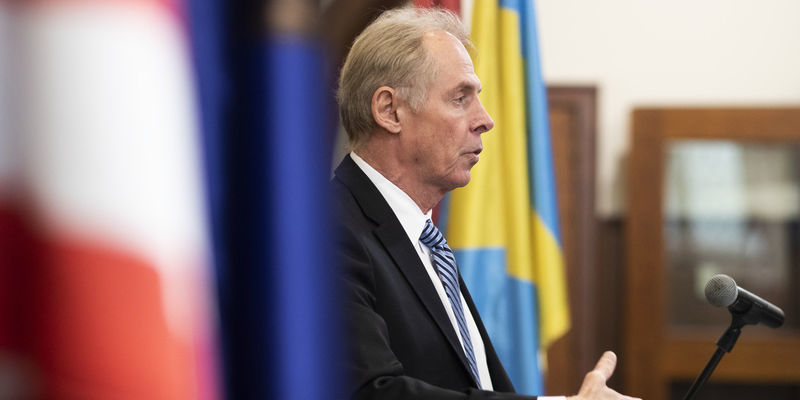Temple University business school’s case study details the personal branding of the recently retired Jason Kelce
Sheri Lambert and Amy Lavin, faculty members at Temple University’s Fox School of Business, completed a new case study that explores the personal branding of Jason Kelce as a professional athlete, formerly on the Philadelphia Eagles.

On March 4, Jason Kelce, a six-time All-Pro and future Hall of Fame center on the Philadelphia Eagles announced his retirement from the NFL during a press conference. At 36 years old and with football being all he has known for the entirety of his professional career, what does his life after football look like? And, to that point, what does his brand post-NFL look like?
These questions are the driving force behind “Jason Kelce, Perfectly Unplanned: A Dive into the Personal Branding of an NFL Athlete,” a new case study completed by Sheri Lambert, associate professor of practice in marketing and Amy Lavin, assistant professor of management information systems at Temple University’s Fox School of Business.
Recently published by Ivey Publishing, the case study examines the personal branding strategies Kelce implemented during his NFL career and outlines his next steps following his retirement from professional sports. Lambert teaches the case in her Marketing Strategy (undergraduate capstone) and Marketing in Management (graduate) courses that focus on branding.
“This class enables Temple students to put themselves in the shoes of managing a professional athlete and learn effective branding strategies,” said Lambert. “Kelce earned credibility through success on the field and by only supporting brands he believed in.”
“Despite being an NFL star, he remained true to himself as the everyman you would hang out with at a bar for a sandwich or a beer,” Lavin added. “Kelce’s perfectly unplanned self is authentic and resonates with various demographics from tweens to teens and Gen-Z to boomers, which allows others to feel comfortable around him.”
The case outlines the evolution of Kelce’s principles from his humble beginnings as a sixth-round draft pick in the 2011 NFL draft to the development of his values, and how he made a difference in people’s lives and found purpose as an athlete, husband, father and philanthropist.
The case explores how having a multichannel marketing strategy is effective in building a personal brand. One of Kelce’s business ventures includes a podcast, New Heights, with his brother Travis Kelce (also an NFL player with the Kansas City Chiefs), that has become a top sports podcast reaching more than two million subscribers on YouTube and is also broadcast on several mediums like Spotify, Instagram and TikTok. Top brands like Draft Kings, LinkedIn and Athletic Greens have paid for advertising spots on New Heights.
The case also shows that while the quarterback is often the best sponsor for a brand, there are exceptions. As a center, Kelce defied the odds, inking endorsement deals with the Campbell Soup Company and Old Spice. These partnerships meshed well with his image as an “everyman” who is a relatable spokesperson for several brands. Lavin explained his underdog mentality represents who he is and why he named his Philly-centric nonprofit clothing brand Underdog Apparel.
“Even with the deck stacked against him, he kept working hard,” Lavin said. “His hunger and underdog mentality became a part of his brand through his nonprofit.”
Additionally, he founded the (Be) Philly Foundation, a nonprofit dedicated to improving the academic and economic situation of inner-city children, and Team 62, a fundraising page dedicated to the Eagles Autism Foundation.
Since 2013, Kelce’s name and status on and off the field have been the focal point of a brand campaign strategically managed by sports management firm Clarity Sports International. The Clarity Football group took an active role in managing his social media accounts and it focused on choosing topics relatable to his brand while regularly generating a social media calendar.
“Through this case students will learn that an athlete’s marketing manager becomes their right-hand person on almost everything because it can benefit their brand image," said Lambert.
Fast forward to 2023, Kelce was at a crossroads. It had been five years since his team won the Super Bowl, but he was not ready to retire from football, though he knew the end was near. Thus, he reinvented his brand, showcasing a softer side as both a husband to his wife, Kylie and a father to his three daughters, Wyatt, Elliotte and Bennett.
“In addition to being a guy that you would grab a drink with, Kelce’s branding focused on being a family man,” Lambert said. “He was often seen playing with his daughters after practice or reading them stories, which also won over people who don’t necessarily watch football.”
In the same year, after an Eagles training camp practice, he had planned to wear jeans and a blazer at the premiere of the Amazon Prime documentary Kelce, which highlights his career. However, he wore a t-shirt, shorts and flip-flops instead.
“Going with the flow and not caring what others think represents his brand,” Lambert said. “Like last year, he was in a pile of clothes for a Tide commercial. It shows any endorsement he is associated with speaks to who he is.”
As for what business ventures Kelce could pursue next, Lavin said there should be opportunities for him to extend his endorsements that are authentic and align with his everyman image.
“His most loyal fan base is the everyman, so his future endorsements should continue to connect with his target audience,” said Lavin
She added there will also be opportunities for him in sports broadcasting and projects that focus on his charities and commitment to helping communities while being a good role model for youth and others.
“Typically, sportscasters are former quarterbacks like Tony Romo or Troy Aikman. However, Jason has also exhibited a similar leadership role in an NFL organization,” she said. “Fans could enjoy seeing the intelligent side of him from his quick wit and personality that they can identify with.”


